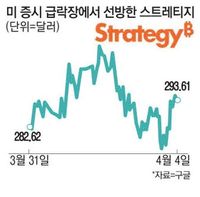In a dramatic turn of events, Bitcoin plummeted to a nearly one-month low during early morning trading on April 7, 2025, as economic uncertainty mounted following President Donald Trump’s announcement of a 10% blanket tariff on all imports. This move has not only rattled the cryptocurrency market but has also sparked fears of a potential market crash reminiscent of the infamous "Black Monday" in 1987.
According to reports, the cryptocurrency market, along with global stock markets, experienced a significant downturn. The total market capitalization of cryptocurrencies dropped by approximately $500 billion last week, with Bitcoin itself falling as much as 7% to a low of $77,171.1 before slightly recovering to $78,290.7 by 19:54 GMT (23:54 local time). The sharp decline in risk appetite among traders was directly linked to the escalating trade tensions and tariffs proposed by Trump, which have already resulted in a staggering loss of about $4 trillion in global stock markets since the announcement.
Traders are now expressing heightened anxiety over the possibility of a "Black Monday" scenario, similar to what occurred in 1987 when the stock market crashed. As risk aversion rises, many investors are turning to traditional safe havens like gold and the Japanese yen, leaving speculative assets like Bitcoin and other cryptocurrencies vulnerable to sharp declines.
Lawrence Summers, former chairman of the White House National Economic Council, voiced strong concerns regarding the impact of tariffs on the U.S. economy, stating that they would lead to inflation, reduced consumer spending power, and potential job losses. Summers remarked, "Tariffs will be the biggest harm to the U.S. economy." His comments resonate with many in the financial community who fear that the current economic policies could lead to severe repercussions for both the stock and cryptocurrency markets.
Bill Ackman, a prominent hedge fund investor, echoed these sentiments on social media, stating that while he supports Trump's intention to reform the international economic system, the implementation of tariffs is detrimental, asserting, "Tariffs disrupt the market." Ackman warned that such policies could trigger an economic war, causing investors to lose confidence in the U.S. as a reliable trade partner.
As the markets reacted to these developments, Nasdaq futures saw a significant decline, dropping over 6.09% to trade at 17,539.00. This sharp downturn reflects the broader market's anxiety over the future of economic stability under the current administration.
In the cryptocurrency space, Bitcoin's recent losses were compounded by the movement of approximately $160 million worth of coins to the Kraken exchange, a move that suggests potential selling pressure from major holders, often referred to as "whales." This has further fueled fears among traders that the cryptocurrency market may continue to decline if the U.S. stock market does not stabilize.
The overall cryptocurrency market was not spared from the turmoil, with altcoins suffering significant losses. Ether, the second-largest cryptocurrency, fell nearly 13% to $1,577.30, marking its weakest level since October 2023. Other notable declines included Ripple, which dropped 11.4% to $1.9033, while popular tokens like Solana, Cardano, and Polygon also saw declines exceeding 10%. Even meme tokens like Dogecoin fell nearly 13%, and the $TRUMP token hit a record low of $7.87.
Despite these challenges, some analysts remain optimistic about Bitcoin's resilience. Max Keiser, a Bitcoin maximalist and advisor to the El Salvador government, stated that while Trump's policies may cause significant upheaval, Bitcoin still possesses strong recovery potential. He emphasized that the only sustainable way to improve the quality of life for Americans is through the accumulation of Bitcoin.
In a related development, a Brazilian court ruled that cryptocurrency assets could be subject to seizure in cases of tax debt, further legitimizing the status of cryptocurrencies in financial and legal frameworks. This ruling indicates a growing recognition of digital assets in traditional financial systems, which could have long-term implications for the market.
Meanwhile, the cryptocurrency market is also witnessing a significant shift in investor sentiment. A recent weekly survey indicated that 35.1% of domestic investors expect Bitcoin to rise or surge in the coming week, while 60% support the Bank of Korea's pilot test for a central bank digital currency (CBDC). This suggests that while immediate market conditions appear bleak, there is a segment of investors who remain hopeful about future opportunities in the cryptocurrency space.
As the market grapples with uncertainty, the Altcoin Season Index has registered a slight increase to 16, indicating a potential shift in market dynamics. However, the Crypto Fear & Greed Index remains at 30, reflecting ongoing fear among investors.
In the wake of the recent market turbulence, the SEC has clarified its stance on stablecoins, stating that certain types of dollar-pegged tokens are not classified as securities. This announcement may provide some regulatory clarity for the market, which has been grappling with questions surrounding the legal status of various digital assets.
In summary, the cryptocurrency market is experiencing a tumultuous period, with Bitcoin and other digital assets facing significant pressure due to economic policies and global market dynamics. As traders brace for potential further declines, the future of cryptocurrencies remains uncertain, with both risks and opportunities on the horizon.

![[모닝 뉴스브리핑] 아서 헤이즈](https://thumbor.evrimagaci.org/Q44IXhDVDdlptQ_1XGCPBi8JF00=/200x0/tpg%2Fsources%2Fb32196cc-0fe2-4394-808c-1d2017492898.jpeg)



